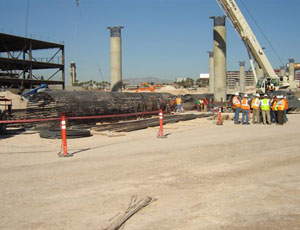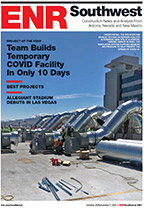On June 23, five steelworkers were injured when a 6-ft-dia., 70-ft-long rebar cage collapsed at the $2.4-billion Terminal 3 project at McCarran International Airport in Las Vegas. Around 7 a.m., Tuesday, workers were attaching interior wire supports for the number 11-sized rebar cage lying on the ground lengthwise when it collapsed, trapping them inside. An unidentified worker used a forklift to elevate the weight off of the men until the Clark County Fire Dept. arrived. It took 30 minutes to extract the men by cutting the rebar cage, which was to serve as a structural component of a subterranean roadway bridge in front of the new 1.87-million-sq-ft terminal three building.

Steelworkers were employed by San Diego-based Pacific Coast Steel, which had been onsite since February as a subcontractor to Perini Building Co., a unit of Tutor Perini Corp., Framingham, Mass. The three-level, steel-and-glass structure along Russell Road, just east of Maryland Parkway, measures 300-ft-wide by 2,300-ft-long; it's the equivalent of six football fields laid end-to-end. Pacific Coast Steel has completed over 1,400 rebar cages in total at the airport, each weighing up to 30,000 pounds once complete.
“The worst [injury] was a punctured lung and a fractured hip,” said Randall H. Walker, director of the Clark County Dept. of Aviation, which oversees McCarran, during a 10:30 a.m. press conference. “And that was the same gentleman.”
Two men have since been released from Sunrise Medical Center, and three others are in stable condition at University Medical Center. Names were not disclosed. They were members of the Reinforcing Ironworkers Union, Local 416, which covers Los Angeles and Las Vegas. The cause of the collapse is unknown. The Nevada Occupational Safety Health Administration is conducting an investigation. Construction resumed that day at other parts of the project. The 14-gate terminal three is still expected to finish in mid-2012. Houston-based PGAL is the project architect, with Walter P Moore as structural engineer.
“We're just really thankful all five of them are going to do well and be fine," Walker said.
This marks the second accident in four months at the airport. On February 23, Byron Souza was killed at the site. The 25-year-old laborer died of blunt force trauma to the head from a compact motorized earth moving shovel. Souza was an employee of Las Vegas Paving Corp; he was also a member of the Laborers International Union of North America, Local 873. The death was ruled an accident. It had been the first construction-related fatality on a Clark Dept. of Aviation project in over 16 years, reports San Francisco-based construction manager Bechtel Corp.
“Unfortunately, and as with all construction projects, the possibility of unforeseen accidents resulting in bodily injury and death is ever present,” said Las Vegas Paving Corp. in a statement.
A spate of Las Vegas-area worker accidents have since resulted in required construction worker safety training. On June 3, Nevada Gov. Jim Gibbons (R) signed Assembly Bill 148 into law requiring construction workers to complete 10 hours of Occupational Safety and Health Administration safety training within 15 days of hire; supervisors must undergo 30 hours of OSHA training within the same time frame. The measure was enacted one-year after Perini Building Co. and the Southern Nevada Building and Construction Trades Council agreed to end a 24-hour strike that erupted over eight jobsite deaths within 18 months between 2007-08 at the $8.5-billion CityCenter and $3.9-billion Cosmopolitan developments on the Strip. The law becomes effective Jan. 1, 2011. Employees who fail to produce proof of OSHA training must be suspended or terminated; employers must document and provide proof of training or face fines up to $1,000 as well as state sanctions.


Post a comment to this article
Report Abusive Comment